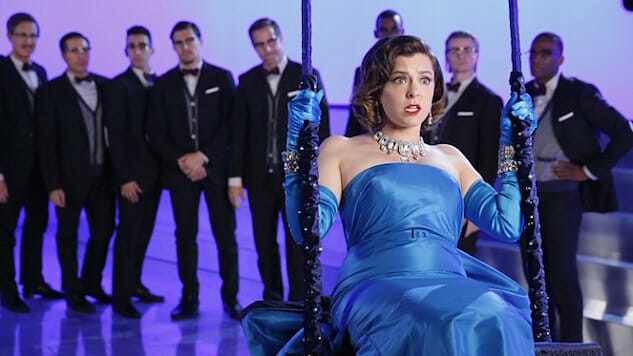The Songs of Crazy Ex-Girlfriend: Gay Geometricians Can’t Save Rebecca from Herself
(Episode 2.03)
The CW
Rachel Bloom, Crazy Ex-Girlfriend’s creator and star, has commented before about the fetishization of celebrities like Marilyn Monroe—namely, depressed, beautiful, fragile, even childlike women. They’re the perfect level of vulnerable to play into the worst predations of masculinity and have famous enough images to be admired by some women. This fantasy, romanticizing dangerous, sad, destructive things, is the mindset that fuels the show’s plot and infects the otherwise rational mind of its protagonist.
If anything, it’s selfishness—and a predilection for buying into a worldview that reinforces this selfishness. In the Gentlemen Prefer Blondes parody in “All Signs Point to Josh… Or Is It Josh’s Friend?” Rebecca Bunch (Bloom) inhabits the idolized center of male attention co-opted from Monroe by Madonna and Nicole Kidman. Wearing the “Diamonds Are a Girl’s Best Friend” rocks, gloves, and Marilyn bob, Rebecca lives out her delusion in a song where the male dancers aren’t just fawning scenery, but the voice of reason.
Of course, we find out at the end of the song that they’re all gay, and thus immune to her babyish charms.
White Josh (David Hull) himself has become a queer voice of reason in the show’s second season, deflecting the straight drama around him while continuing to nurture, with Darryl (Pete Gardner), Crazy Ex-Girlfriend’s healthiest relationship, and the song similarly critiques the straight characters’ judgment when Hollywood fantasies of sex and love are on the table. As long as a fairy tale or rom-com romance is available (like the ones straight people have had sold to them by mass entertainment since, well, forever), normally sane individuals continually make terrible choices.
Greg (Santino Fontana) and Josh (Vincent Rodriguez III) are also caught up in the dream of perfect love, but both have been buffeted by their incompatibility with Rebecca’s preconceptions. The show’s queer characters have already had to face their sexual realities in a world of prejudice—which, the show seems to argue, allows them to face love more maturely. The polyamorous trio dampening Rebecca’s cold-open fantasy relationship is a direct rebuttal to her romantic reveries, as are the backup singers’ professorial asides during “Love Triangles.”
“When you do comedy music, it’s a different headspace than if you’re just doing music,” as Crazy Ex-Girlfriend’s music producer, Adam Schlesinger, formerly of Fountains of Wayne, recently told the Los Angeles Times. “We’re mostly thinking: Is something going to distract from the joke? You don’t want anybody to mostly be thinking about the music at all. It’s the straight man of the joke.”
-

-

-

-

-

-

-

-

-

-

-

-

-

-

-

-

-

-

-

-

-

-

-

-

-

-

-

-

-

-

-

-

-

-

-

-

-

-

-

-








































